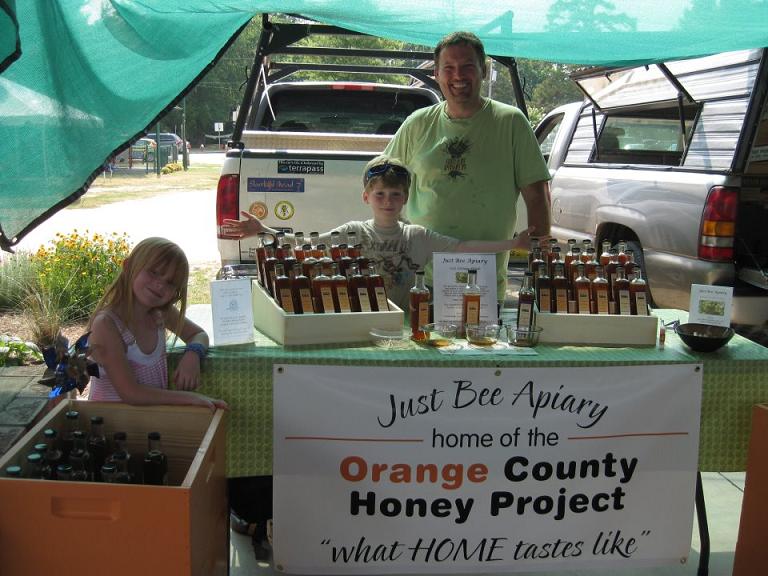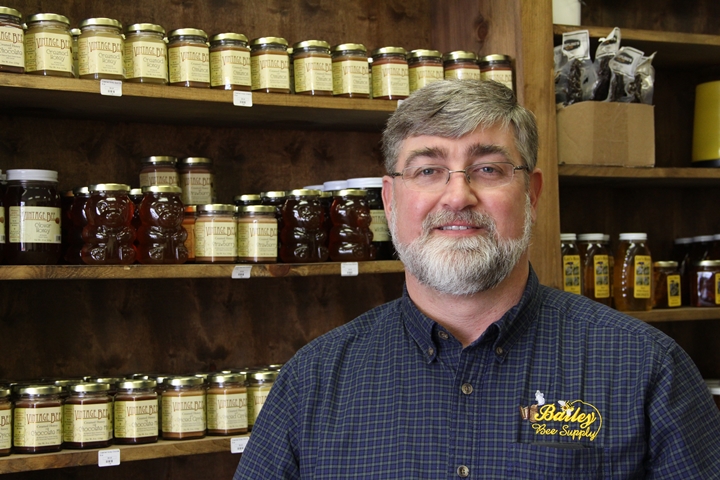 What’s sweeter than honey? A taste of your hometown’s honey. As the buzz builds around the worldwide honey bee crisis, Marty Hanks, owner of Just Bee Apiary in Chapel Hill, has created a fundraiser to bring awareness to honey bees in Orange County.
What’s sweeter than honey? A taste of your hometown’s honey. As the buzz builds around the worldwide honey bee crisis, Marty Hanks, owner of Just Bee Apiary in Chapel Hill, has created a fundraiser to bring awareness to honey bees in Orange County.
Hanks’ Hometown Honey Taste Off has hives located throughout Orange County. Building on the premise that honey bees stay within three to five miles of their hives, Hanks has created a way for Orange County locals to literally get a taste of their hometown.
The hives are publicly situated at sites including: atop Tyler’s Restaurant, the Saxapahaw General Store’s garden, TOPO Distillery, the Abundance Foundation, Crawford Farm and others.
The fundraiser aims to sustain honey bees in the local community. It also supports Just Bee Apiary by helping provide needed tools for the chemical-free apiary and educational materials for the community.
The apiary faced a 60 percent loss in its livestock (yes, bees are considered livestock) in 2012. Reports estimate the national honey bee loss in 2012 was between 31 and 40 percent. Colony collapse disorder (CCD), malnutrition due to monocrop planting, reduction of wildflowers and other pollinators, varroa mites and other issues are decreasing colonies throughout the U.S.
“Honey is a liquid time capsule of Mother Nature’s fingerprint of every community,” says Hanks. “Every year we have different amounts of rain and sun, different climate influences. This produces a different honey each year. It’s the rarest food source. We need to preserve it because it tells a human story, our story.”
You can support honey bees and Hanks’ apiary by donating to his fundraiser here. But you’ll have to be quick, the fundraiser ends July 11, 2013.
“Let’s look at our town in a way we never have before—through taste. Protect your source by supporting organic farmers and foods, planting pollinating plants and buying your honey from local beekeepers,” says Hanks.
Hanks is not alone in his love of honey. Local beekeepers range from hobbyists to commercial production apiaries, says David Bailey of Bailey Bee Supply. Bailey (pictured below) keeps apiary owners stocked from his Hillsborough store, the only beekeeping supply store centrally located in North Carolina.

“You can support your local beekeepers by educating yourself on honey bees. A good way to start is by avoiding pre-emergents for your lawn. Bees can mistake these granules for pollen and take them back to the hive, harming the whole colony. You can also plant pollen and nectar-producing plants when planning your landscaping; for example, use blueberries instead of a hedgerow,” says Bailey. (Click here for Bailey’s list of these bee-friendly botanicals). “And, of course, you can buy local honey.”
Local honey and other honey bee products can be found at Bailey Bee Supply and the Carrboro Farmers’ Market as well as at other local farmers’ markets and stores.
Bailey has seen an encouraging upswing in beekeeping. He says the average beekeeper used to be in his or her forties or fifties, but now parents come in with their kids to get outfitted for apiary adventures.
For budding beekeepers, there is community support available. Bailey Bee Supply offers classes to help beginners get started. Beekeepers can join the community with the Orange County Beekeepers’ Association.
All of this is in just in time for National Pollinator Week, recognized June 17-23. Participate in Pollinator Week with tours and programming at the North Carolina Botanical Gardens in Chapel Hill.
The honey bee crisis stems out to national concern over food supply and the economy. Hanks and Bailey agree with the “1 in 3 bites” estimate that states that one in every three bites of food consumers in the U.S. eat is pollinated by honey bees. Start local and help save Orange County honey bees.
Image #1 via Marty Hanks
Image #2 via SP Murray



Comments on Chapelboro are moderated according to our Community Guidelines